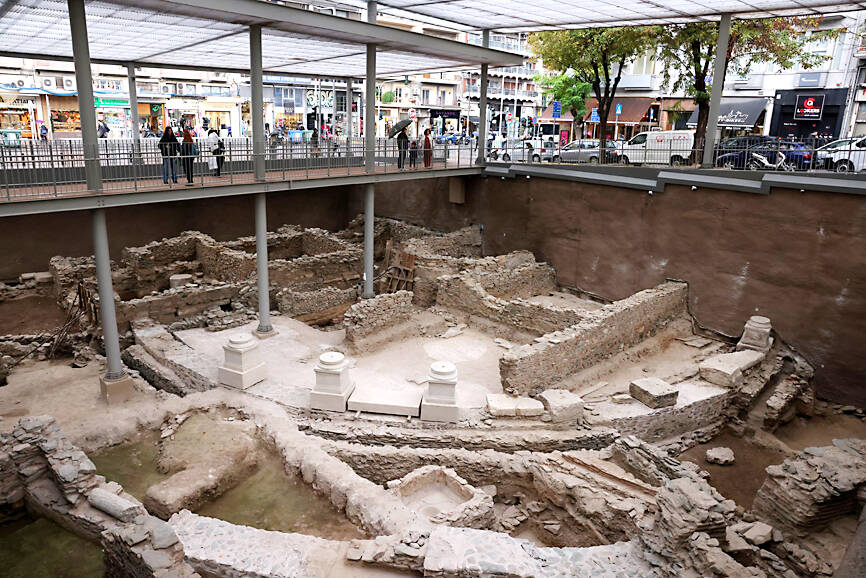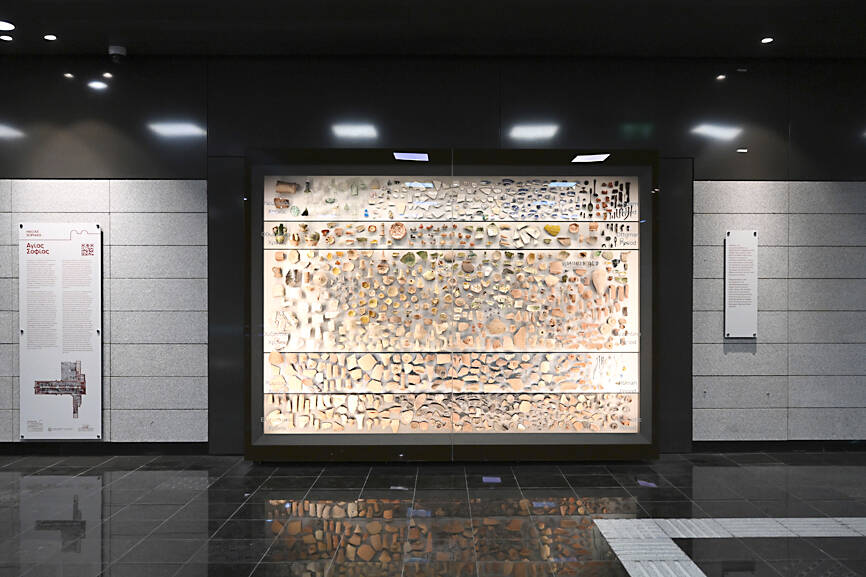It caused untold commotion, decades of disruption and — among historians and archeologists — controversy and despair, but at midday on Saturday, the antiquities-rich subterranean world of Thessaloniki opened to a world of driverless trains and high-tech automation with the inauguration of its long-awaited subway.
The excitement on the streets of the northern Greek port city is almost palpable. “Archaeologically, it has been an extremely complex and difficult endeavor,” said Greek Minister of Culture, Education and Religious Affairs Lina Mendoni of the more than 300,000 finds made since construction began 22 years ago. “To get here required a battle on many fronts.”
The discovery of treasures never before seen — many to be exhibited in the stations themselves — promises a modern ride through the multilayered history of a metropolis that dates back 2,300 years and through which the Romans, Byzantines and Ottomans all passed.

Photo: Reuters
Two marble squares, an early Christian basilica, a Roman-era thoroughfare, water and drainage systems, and ancient Greek burial sites brimming with jewellery and gold are among the trove.
Signature pieces are showcased in the 13 “archeo-stations” opened in central Thessaloniki last weekend. More would be added when a second line is completed next year.
“What you see offers a remarkable blend of the ancient and modern, integrating archeological heritage with metro infrastructure,” Greek Minister of Infrastructure and Transport Christos Staikouras told reporters last month.

Photo: AP
As part of the carefully orchestrated inauguration, an “entire archaeological site” kept under wraps was unveiled for the first time at the central Venizelou station on Saturday.
After touring the site with a delegation of officials, including Greek President Katerina Sakellaropoulou, Greek Prime Minister Kyriakos Mitsotakis said: “I think that when the people of Thessaloniki have the chance, tomorrow, to see this station they will recognize the huge effort that has been put in so that the city could have antiquities and a metro.”
The fully automated rapid transit system — the first of its kind in Greece — is expected to serve more than 250,000 passengers a day, reducing traffic congestion by as many as 60,000 vehicles.
The underground’s complex engineering explains why, at least initially, it would only run along a 10km track, spawning complaints over the network’s limited reach — an extension to the city’s international airport eight miles away is planned for 2040.
Not since the Athens subway system was inaugurated almost 25 years ago has an infrastructure project of such scale or significance been undertaken in Greece.
The subway was originally scheduled for completion in 2012.
From the outset, the problem-plagued public project not only brought mayhem to Thessaloniki’s most central district, but became symbolic of government ineptitude and what local people viewed, more generally, as the disregard with which officials treated the country’s northern capital.
The unearthing of so many artefacts forced engineers and archaeologists to collaborate closely in what became one of Greece’s biggest and most controversial excavations.
Metro tunnels had to be dug at least 20m deep to preserve finds nearer the surface while architects were compelled to return to their drawing boards to redesign stations as treasures were discovered.
The delays and additional financial demands of a transport network that has already cost 3 billion euros (US$3.17 billion) have spurred the Greek culture ministry to describe the project as the “biggest salvation work” ever carried out in Greece.
Not all agree. Echoing the consternation of some fellow historians, Angelos Chaniotis, professor of ancient history and classics at Princeton University, bemoaned what he said were treasures “sliced horizontally and vertically” before being “stitched together, like a puzzle” to accommodate the subway.
Far from being a cause for jubilation, construction of the subway had “undermined the authenticity of the antiquities and does not justify celebrations,” he wrote in an op-ed published in the more usually pro-government Kathimerini newspaper.

ANGER: A video shared online showed residents in a neighborhood confronting the national security minister, attempting to drag her toward floodwaters Argentina’s port city of Bahia Blanca has been “destroyed” after being pummeled by a year’s worth of rain in a matter of hours, killing 13 and driving hundreds from their homes, authorities said on Saturday. Two young girls — reportedly aged four and one — were missing after possibly being swept away by floodwaters in the wake of Friday’s storm. The deluge left hospital rooms underwater, turned neighborhoods into islands and cut electricity to swaths of the city. Argentine Minister of National Security Patricia Bullrich said Bahia Blanca was “destroyed.” The death toll rose to 13 on Saturday, up from 10 on Friday, authorities

Local officials from Russia’s ruling party have caused controversy by presenting mothers of soldiers killed in Ukraine with gifts of meat grinders, an appliance widely used to describe Russia’s brutal tactics on the front line. The United Russia party in the northern Murmansk region posted photographs on social media showing officials smiling as they visited bereaved mothers with gifts of flowers and boxed meat grinders for International Women’s Day on Saturday, which is widely celebrated in Russia. The post included a message thanking the “dear moms” for their “strength of spirit and the love you put into bringing up your sons.” It

DEBT BREAK: Friedrich Merz has vowed to do ‘whatever it takes’ to free up more money for defense and infrastructure at a time of growing geopolitical uncertainty Germany’s likely next leader Friedrich Merz was set yesterday to defend his unprecedented plans to massively ramp up defense and infrastructure spending in the Bundestag as lawmakers begin debating the proposals. Merz unveiled the plans last week, vowing his center-right Christian Democratic Union (CDU)/Christian Social Union (CSU) bloc and the center-left Social Democratic Party (SPD) — in talks to form a coalition after last month’s elections — would quickly push them through before the end of the current legislature. Fraying Europe-US ties under US President Donald Trump have fueled calls for Germany, long dependent on the US security umbrella, to quickly

In front of a secluded temple in southwestern China, Duan Ruru skillfully executes a series of chops and strikes, practicing kung fu techniques she has spent a decade mastering. Chinese martial arts have long been considered a male-dominated sphere, but a cohort of Generation Z women like Duan is challenging that assumption and generating publicity for their particular school of kung fu. “Since I was little, I’ve had a love for martial arts... I thought that girls learning martial arts was super swaggy,” Duan, 23, said. The ancient Emei school where she trains in the mountains of China’s Sichuan Province